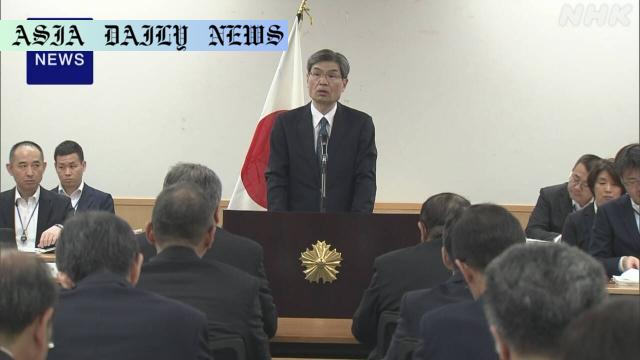Traffic Accidents: Commissioner Kusunoki Yoshinobu emphasizes comprehensive traffic safety education and enforcement to curb rising accidents involving foreign drivers.
- The National Police Agency of Japan is addressing the rising number of traffic accidents caused by foreign drivers.
- Commissioner Kusunoki Yoshinobu emphasized safety education and firm guidance for companies hiring foreign drivers.
- Authorities are cracking down on illegal unlicensed taxi services provided via private vehicles.

Introduction: Addressing Traffic Accidents in Japan
Traffic safety has become an essential discussion topic in Japan as the National Police Agency reveals a significant rise in traffic accidents involving foreign drivers. In a recent address, Commissioner General Kusunoki Yoshinobu called for comprehensive measures aimed at curbing this worrisome trend, which saw 7,286 incidents reported in the last year alone — an increase of over 1,800 cases compared to five years ago. These numbers highlight the urgent need to reassess not only current traffic safety protocols but also the preparedness of foreign nationals to navigate Japan’s roads.
The Challenges Faced by Foreign Drivers in Japan
Japan’s intricate and often unique traffic regulations may pose challenges for drivers unfamiliar with local laws, especially those new to the country. Many foreign residents and tourists may struggle to comprehend the nation’s driving rules, such as priority roads, unusual signage, or even proper etiquette during different traffic circumstances. This lack of familiarity inevitably raises the risk of accidents, creating a pressing issue for authorities to address.
Improving Educational Programs for Road Safety
One of the core recommendations proposed by Commissioner Kusunoki is enhancing the accessibility and effectiveness of road safety education programs tailored to foreign drivers. Collaborative efforts with car rental companies and multinational corporations are deemed necessary to bridge the knowledge gap. Likewise, providing specialized training to firms hiring non-Japanese drivers can significantly lower accident risks by equipping them with the theoretical and practical knowledge specific to driving in Japan. Ensuring that resources, such as multilingual traffic guides and simulation-based learning, are readily available stands as one method to create a more aware and educated foreign driving demographic.
Combating Unlicensed Taxi Operations
Another vital step identified by police is addressing the unregulated taxi services offered through private vehicles. These illegal transport providers, often a magnet for foreign tourists, add an additional layer of complexity to ensuring traffic law enforcement. Patrons engaging these services unknowingly place themselves at risk, while illicit drivers exacerbate the strain on public safety resources. Consequently, heightened surveillance and stricter penalties for such violations are being prioritized to restrict these activities.
Collaboration with Rental Companies and Employers
Collaboration between the authorities and private entities such as car rental companies and corporate employers who hire foreign drivers is essential. Rental companies can play their part through pre-drive orientations highlighting key rules and verifying appropriate documentation. On the other hand, corporations must invest in comprehensive training programs that educate employees about driving nuances in Japan. Enhanced cooperation between these stakeholders will help alleviate risks and foster a safer driving environment.
Long-Term Benefits of Proactive Enforcement
By addressing traffic safety concerns through education, collaboration, and law enforcement, Japan could build a more secure road system for all its residents and visitors. Proactive measures against traffic violations and better integration of foreign drivers into the nation’s traffic culture will reduce accident numbers, protect lives, and maintain trust in Japan’s transportation system. While the road to improvement requires consistency and patience, advancements in these areas will yield lasting positive outcomes for the country’s diverse demographics.



Commentary
The Importance of Addressing a Growing Safety Concern
The rise in traffic accidents involving foreign drivers in Japan is an issue that demands immediate and thoughtful attention. The challenges stem not just from unfamiliarity with Japanese traffic regulations but also from cultural and linguistic barriers that can complicate understanding. Commissioner Kusunoki Yoshinobu’s call to action is timely — it underscores the importance of creating an all-encompassing solution that addresses the root causes of these incidents.
Understanding the Needs of Foreign Drivers
Driving in a foreign country is never easy, especially if the local rules significantly differ from what one is accustomed to. Japan has highly regulated traffic systems, and although efficient, they can seem overwhelming to newcomers. It is vital to approach this issue with empathy and recognize that many accidents are not caused by intent but by an absence of appropriate knowledge. Tailored educational programs and multilingual resources could help alleviate this problem over time.
The Role of Community and Coordination
Collaboration between police, local government bodies, and private entities is key to achieving meaningful change. From rental car agencies to multinational corporations, each stakeholder has a role to play in building a road safety culture that includes foreign nationals as valued participants. However, beyond organizational efforts, fostering peer-to-peer recognition of traffic safety among communities may prove equally effective.
Moving Forward with Safety First
Solving the issue of foreign driver-related traffic accidents in Japan is not just about enforcing rules; it’s about creating an ecosystem of education, cooperation, and respect for shared spaces. This initiative can serve as a model for other countries facing similar challenges, representing how inclusivity and safety truly go hand in hand.